Armenia and EU have the opportunity to cooperate in all fields: Ambassador Wiktorin’s exclusive interview to ARMENPRESS
39 minute read

YEREVAN, AUGUST 22, ARMENPRESS. The relations between Armenia and the European Union passed through different phases over the course of the 30 years of cooperation.
Today, Armenia and the EU have defined a very broad circle of cooperation, and the Comprehensive and Enhanced Partnership Agreement (CEPA) signed in 2017 provides the opportunity to cooperate in all fields.
On the occasion of the 30th anniversary of establishment of diplomatic relations between the Republic of Armenia and the European Union, ARMENPRESS State News Agency conducted an interview with the Head of the Delegation of the European Union to Armenia, H.E. Ambassador Andrea Wiktorin.
In the interview, Ambassador Wiktorin spoke about the relationship between Armenia and the EU and also presented her views on the prospects of the Nagorno Karabakh conflict settlement, the negotiations between Armenia and Azerbaijan and the normalization process between Armenia and Turkey.
The interview was conducted on 18 July 2022.
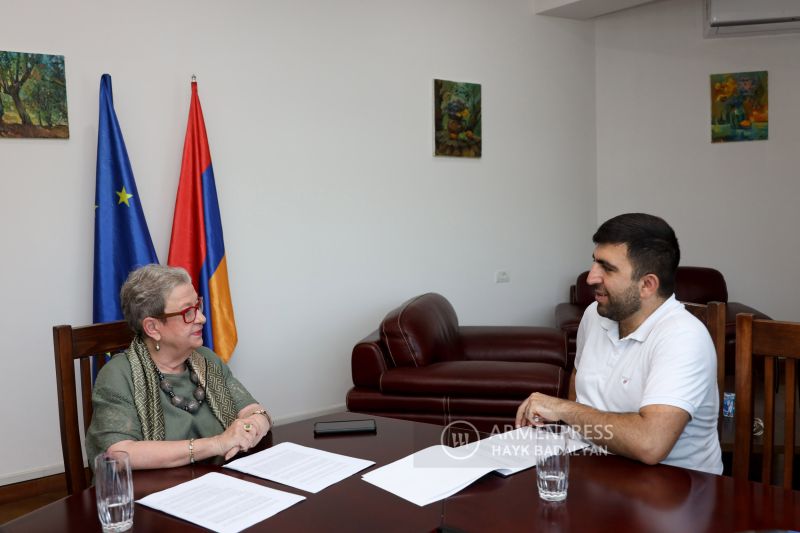
ARMENPRESS: Ms. Wiktorin, thank you for this great chance to have an interview with you for the first time. We have many interesting questions to discuss about the Armenia-European Union agenda. Let me start by asking how do you feel in Armenia and how have you spent these 3 years of your diplomatic mission in Armenia compared to your work elsewhere?
Ambassador Wiktorin: As you might know, I had a diplomatic mission in Armenia before. I was the German Ambassador here between 2007 and 2009. When I came back in 2019, I think there was quite a big change in the atmosphere in the country and the mood of the people. There are also many positive steps we have been taking together in cooperation with Armenia. Therefore, this was overall very positive and I had an excellent start, visiting many regions, seeing a lot of projects. Afterwards we all ended up in the same challenging situation. First of all, the COVID-19 pandemic started and we had the lockdown with all the consequences it had for direct contact, but also on how to improve the cooperation. Then the war on 27 September 2020, its aftermath, the elections in 2021… So, it was always a very busy period. Naturally, I was also touched by the feelings of the Armenians in this difficult period. However, overall, I am still optimistic. I like Armenia, the countryside. I am happy that we can go on mission again after this long period of break due to COVID. I have been several times in Syunik only in the last months, not to mention the other regions of Armenia. This is always a very good possibility to meet people, to hear their direct assessment and to learn about their direct needs. This is a very important element of my work here.
ARMENPRESS: What do you like most about Armenia and what do you think Armenia is most about?
Andrea Wiktorin: Armenia has ancient traditions and culture. It is a Christian country with many impressive cultural monuments. For me the most impressive are the people, the variety of characters, and the vibrant cultural scene, which I appreciate very much. Yesterday I was at the closing ceremony of Golden Apricot Film Festival. There are so many things ongoing here, and I love to discover new sites, new cultural events. This is something that creates the positive image of Armenia, and I appreciate it very much.
ARMENPRESS: As you know, 2022 is a very remarkable year for Armenian diplomacy as the Republic of Armenia marks diplomatic anniversaries with many international partners. Armenia and the European Union mark the 30th anniversary of establishing diplomatic relations as international partners in 1992 after Armenia emerged as a newly independent state in the region. How would you assess the current level of Armenia-EU partnership, where are we now in terms of development of cooperation between Armenia and the European Union?
Ambassador Wiktorin: It was August 10, 1992 when the diplomatic relations between the Republic of Armenia and the European Union were formally established. Naturally, we went through different phases. In the beginning, we had a lot of cooperation via Tacis (European Commission’s technical assistance programme to the Commonwealth of Independent States). I was here when we opened this EU Delegation. It was in February 2008, and the EU Commissioner forExternal Relations and European Neighborhood Policy Benita Ferrero-Waldner came to Armenia. I was invited as a guest, because I was the German Ambassador at that time. The opening of a full-fledged Delegation was an important step forward, as we cover all the areas of relations. With the Lisbon Treaty, which entered into force in 2009, the establishment of the European External Action Service, which is now responsible for the external relations, was an important milestone.
In 2017, we signed the Comprehensive and Enhanced Partnership Agreement (CEPA). It opened a new path in our relationship. Why? We had worked on an Association Agreement, which could not be realized in 2013, and now we really have a framework for our bilateral relations in all areas. With the entry into force in March 2021, Armenia and the European Union have the possibility to cooperate in all areas. This is very important, because this is not only the legal basis for our cooperation, but it is also, as the Armenian government put it, the “blueprint for the Armenian reforms process”.
ARMENPRESS: Regarding for example trade and economics. If I am not mistaken EU’s GSP+ regime for Armenia ended last year. Did this change have significant impact on trade relations and what do we have now?
Ambassador Wiktorin: Armenia’s economic development over the last years has been such that the country progressed from lower to upper middle-income level, as classified by the World Bank. This, in itself, is very good news as it shows that Armenia’s economy is growing.
In the period before, having GSP+ was meant to support the country’s sustainable development. According to the regulations and provisions of the EU GSP regulation, the moment you are an upper middle income country for three years plus a transition period of one year, you lose the status the GSP+ beneficiary, which is unilateral trade concessions by the EU, and this means that since January of this year Armenia can no longer benefit from this preferential import tariffs.
In terms of consequences, it is still too early to tell what the consequences of the end of GSP will be for trade between the EU and Armenia. Moreover, it will be difficult to distinguish the consequences of the end of GSP from other major macro-economic factors affecting the world economy now.
Let me underline that only Armenian goods are affected, meaning the imports of Armenian goods into the EU, but via CEPA we open the door in other directions, which I hope will have a positive effect on the Armenian economy and the trade relations between Armenia and the EU.
Right now, the EU is the second biggest trade partner after Russia. New mechanisms are included in our cooperation, with the aim of having a better regulatory environment, better product standards, creating a better business climate, which will be to the benefit of the European and the Armenian producers. We encourage Armenian companies to sell more goods and services, which will contribute to economic growth and job creation in Armenia.
CEPA also provides for several other provisions, for example for a strong intellectual property rights protection system. This means that both Armenian companies, as well as artists (this is also very important for cultural, creative and selling innovative high-quality products) are now able to rely on a strong intellectual property rights protection system in Armenia, just as they can in the EuropeanUnion. This also helps attracting foreign direct investment into Armenia.
We also further open trade in services, means this opens new opportunities, the liberalization of bilateral trade in many service sectors, forexample in rental/leasing services, consulting, engineering, photographic, packaging, postal, financial and transport services. This means that Armenian companies will be able to provide services in the EU and vice versa.
CEPA also opens up public procurement between the EU and Armenia, giving Armenian businesses the possibility to participate in public procurement tenders in the EU and vice versa. Mutual additional market access is provided regarding works concessions, e.g.water supply and other public services.
Particularly the fact that EU opens the market for services and the possibility to participate in public procurement tenders could have a very positive impact for the Armenian economy.
ARMENPRESS: The European Union is one of Armenia’s key trade partners. According to the statistics of Armenian side, European side the trade turnover between Armenia and EU amounted around 1.2 billion Euros in 2021. Do you see any prospects to enhance the spheres of trade and economic cooperation between the sides, especially using the instruments CEPA could provide?
Ambassador Wiktorin: Yes, as I explained. CEPA provides for new regulations, which on one hand protect the producers both in the EU and in Armenia, and on the other hand open new markets. I think we are really heading into new areas of cooperation, for example creative industries. They are very important also in the EU. We just signed a contract of ‘KATAPULT Creative Accelerator Programme’ last week, which is supporting creative industries here in Armenia. The whole IT sector is another domain where I see huge potential for Armenian companies to enter the EU market. Thus, I think there are so many areas of cooperation that this will have a positive impact on trade and economic relations.
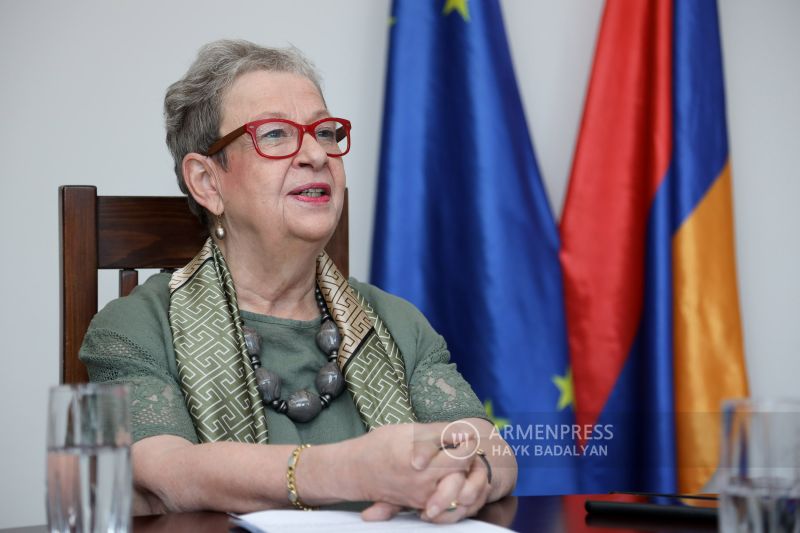
ARMENPRESS: What other significant spheres can you point out in CEPA? Political reforms, human rights, democracy…
Ambassador Wiktorin: CEPA opens cooperation in all areas. As the European Union is value-based, we have a strong cooperation in the field of good-governance, which means EU supports the reform process in Armenia, especially in the field of rule of law, human rights, which are a central part of our cooperation. We are engaged in the human rights action plan 2020 - 2022, which will end this year. We had a discussion in July on the cooperation in this field and looking forward to the next human rights action plan - 2023-2025. The EU delegation is not only cooperating with relevant ministries, but we are also, as I have already mentioned, closely cooperating with the civil society. We are supporting NGOs that are working in the field of human rights. We have a project with the Armenian Human Rights Defender and are closely cooperating with her. I am in constant contact with her on issues of concern.
Armenia has declared CEPA the blueprint for the reform process. So, we are very strongly engaged in judicial reform, anti-corruption, and police reform. We transferred the next tranche of budget support for the judiciary reform of over 8 million Euros. Why is this important? This is a quality seal for work done in the justice sector. It is a decision of the European institutions to continue the cooperation in the justice sector, which we only do if we think that the cooperation was successful so far. The EU has a very strict system of rules and conditions to get budget support. This payment shows that we have confidence in the justice sector reform. There are challenges, this cannot be denied, and further efforts are needed, but Armenia is implementing these reforms. Currently, we are preparing a new sector budget support programme in this area and we hope to have it approved before the end of the year.
Some weeks ago, we kicked off a new twinning project, which is directed to the fight against corruption together with the Corruption Prevention Committee and the Ministry of Justice and with experts from Germany and Latvia. EU and Armenia have a very broad cooperation and use different tools and instruments.
ARMENPRESS: As a more general view. As far as I can remember, he European direction or the European integration has always been one of main priorities of the foreign policy of newly independent Armenia at least for last 20 years or more. The parties have done so many projects, programs, including the EU neighborhood and enlargement policies, Eastern Partnership and so on. Do you see a final destination for a country like Armenia on this long road of European integration or it is somewhat ongoing, never-ending process?
Ambassador Wiktorin: Well, I think this is the decision of Armenia. Armenia sets the pace of our cooperation... 2013 was not so easy, but I think that with CEPA we have a very good basis for our relations. There is one principle, which is important for the European Union: we want to intensify our cooperation with our Eastern partners, but we will do it according to their own wishes. Therefore, this is the principle “more for more and less for less”, which means the partner countries themselves decide the level of cooperation. Very important – the EU is not trying to be in a competition with other partners. I think it is very important to see the positive outcome of our cooperation over the last years. The CEPA agreement shows that we managed to have close relations while Armenia at the same time is a member of the Eurasian Economic Union. In my opinion, with this agreement we have found a possibility to manage this situation and to meet the aspirations of Armenia. The Armenian government and the Armenian citizens have to decide what they want. If you ask me if it is worthwhile to go for stronger ties with the European Union, naturally I would always support this, because I am a convinced European. The EU and its Member States work together in the Team Europe initiative, and we are very active. It is a clear sign of our engagement and the spirit of cooperation - EU plus the Member States. We have quite a good record here: during COVID, also the support for vulnerable groups after the war, when the Member States joined our initiatives, and now in the future cooperation programs with Armenia, especially the Team Europe initiative in the south, in Syunik.
ARMENPRESS: We often hear such statements during various discussions and conferences and on different political levels about the importance to deepen the European integration and the cooperation with the European Union, we hear many messages about the European Union as a value-based area, we hear statements about the European values the EU tries to promote. In addition, in this regard I think it would be very interesting to hear from you what the European Union is about in a general sense. Is it more a trade and economic area therefore it is about economic cooperation and social prosperity to a great extent; is the more a space of civilization therefore it is a civilizational choice in its main core or maybe it is a geopolitical polar therefore it is a geopolitical choice? I mean, what is the European choice about?
Ambassador Wiktorin: Well, if you ask me, I was born in the 1950s. I was born in a time when Europe still suffered from the consequences of the World War II. I am a German. I grew up with the feeling that we have to prevent another war, we have to go for reconciliation. I am the generation, who is a convinced European. I am the generation of the Elysee Treaty between France and Germany with the aim of reconciliation after the WWII. Therefore, I think The European Union is a union of values. This brought us together, from the history of 1950s until today, to prevent that something like the WWII could happen again. This is also the conviction why the EU and the EU Member States support Ukraine against the aggression from Russia. Naturally, we are also an economic union. Nevertheless, the fundament of the European Union is the understanding that we want to secure peace and stability for Europe, together with all our partners in a joint effort. Due to global challenges EU’s engagement and cooperation is getting stronger. We are deeply convinced that we have to work together to overcome global problems, we have to stand up for our principles and values. And the EU reaches out to countries, who share this conviction and who want to work together with us in this direction. This is the idea behind our major strategic approach, the Global Gateway that we really want to work with our partners together also in infrastructure and economic investment sectors to make progress for all of us.
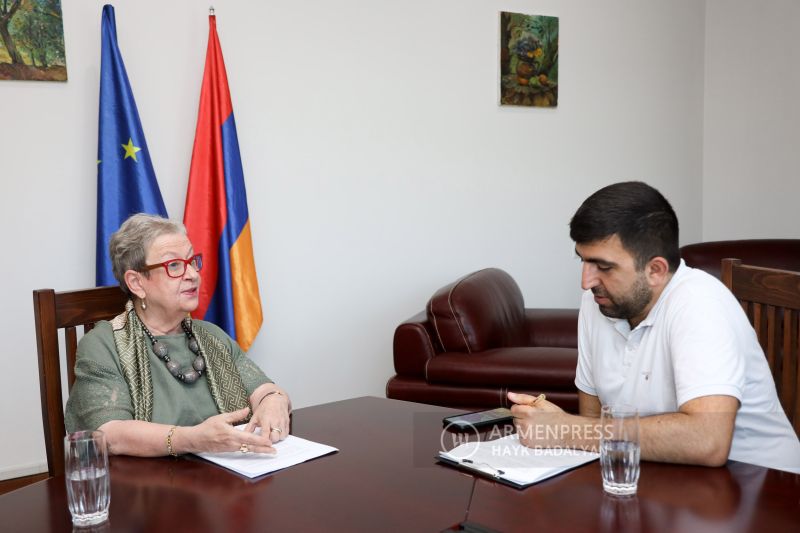
ARMENPRESS: Are there any events planned or maybe already implemented on the occasion of the 30th anniversary of establishment of diplomatic ties between Armenia and the EU?
Ambassador Wiktorin: We have already started. Every year we celebrate after the 9th of May, the Europe Day. We celebrated it this year here in Yerevan, we had a press conference, we had different events for different groups of people, we celebrated in Gyumri, we celebrated in Goris, and this celebrated Europe Day and the 30 years of diplomatic relations and there will be more events to come which will come in the autumn again dedicated to 30 years of diplomatic relations.
ARMENPRESS: Are there any key programs or projects the EU implements in Armenia currently or plans to conduct you want to share with us?
Ambassador Wiktorin: First of all, the European Union is the biggest donor in Armenia. We are cooperating in many sectors. As I already mentioned, the EU is supporting the reforms process in Armenia, which means we are very active in cooperation in the field of justice reform, police reform and anti-corruption. The EU supports many programmers, which support the economic development, for the benefit of the citizens of Armenia, particularly in the regions. Armenia is not just Yerevan, important to develop the regions. For several years now, the EU concentrated certain areas of cooperation on three regions - Lori, Shirak and Tavush with programmers in the field of innovation, tourism and agriculture. EU actively supports green agriculture together with the Austrian Development Agency. Another example: the LEAD Program supports regions and especially rural areas by promoting cooperation between local authorities, business community and civil society to develop joint projects, which enable communities to foster development in rural areas, again in Lori, Tavush and Shirak. Since last year, on the request of the Armenian government, we are heading south, implementing several projects in Syunik in order to support the socio-economic development for the citizens in Syunik.
Another area of cooperation is the Green Deal. The Green Deal is the mantra for the European Union, because we learned that we could only fight climate change and develop the economy in a sustainable way, if we think ecologically and support green enterprises. Energy efficiency is an important sector of cooperation; together with the EU Member States and EIB, we renovate kindergartens in Yerevan, to make them earthquake-safe and energy efficient. Another important project is EU4Sevan, implemented by GIZ.
Support for Civil society is a very important element of our cooperation. We fund civil society organizations in the field of human rights, protection of vulnerable groups, independent media in Armenia.
Another major sector of cooperation is education. EU supports the Ministry of Education on the education strategy, and we hope to have a new big budget support programme for education as soon as the strategy is adopted by Parliament. We are cooperating in the field of culture with Creative Europe, initiating cultural projects here. EU offers scholarships for students with Erasmus +.
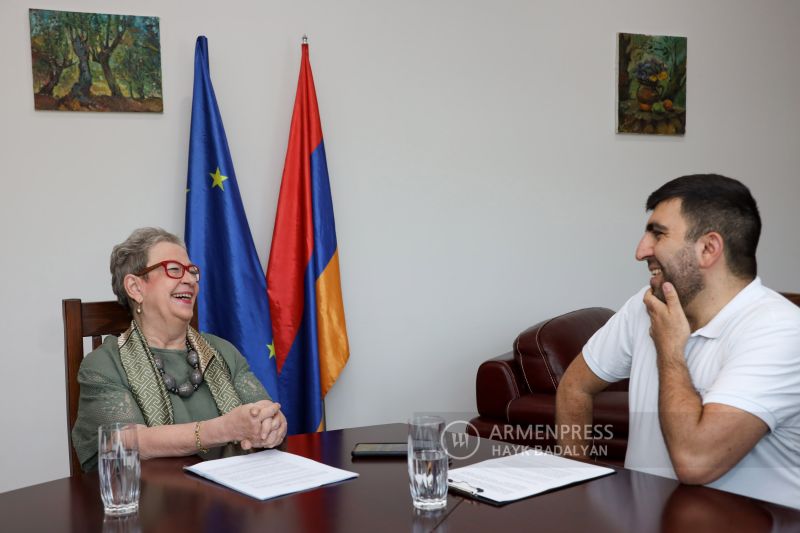
ARMENPRESS: EU Commissioner Olivér Várhelyi made a very interesting and widely discussed announcement in Armenia last year saying the European Union is able to mobilize nearly 2.6 billion Euros for the key programs in Armenia aimed at ensuring economic growth and increasing the number of jobs. I am sure you have been already asked for many times about this statement before, but we would like to ask you to comment on this one more time. I mean people wonder, “Why would they give us so much money?” What is the reason or the stimulus to provide such a vast assistance to Armenia?
Ambassador Wiktorin: Let me first explain once again the design of the Economic Investment plan. The Economic and Investment Plan, available to all Eastern Partnership countries, aims to leverage private and public investments to boost post-pandemic socio-economic recovery, create decent jobs, stimulate innovation and fast-track the green and digital transition. It needs to be underlined that the EUR 2.6 billion is not an allocated financial package of EU grant funding, but refers instead to the potential of total investments that may be leveraged in the country as part of the Eastern Partnership’s Economic Investment Plan, endorsed by EU and Eastern Partnership leaders at the Summit in December last year. As for all leveraged investments foreseen in the Economic Investment Plan, the bulk of these potential investments would come through loans from IFIs and investments of the private sector. Currently, we are together with the EBRD and EIB to use other financial instruments like guarantees or blending in order to ensure bigger investments here in Armenia. Now we are very active to develop several flagship initiatives. One is to support SMEs.
The EU is discussing with the banks how we can help on the infrastructure of the North-South Road Connection. EU and EBRD already supported the feasibility study of this big project. Then we will have additional big programmers in Syunik. One of them, which is nearly in the final stage of preparation, is to support two COAF centers in Syunik jointly with EIB. We combine this with the EU Team Europe initiative to do more for small and medium sized companies, social-protection and different projects in Syunik.
Another important flagship is Green Yerevan. It was the first contract signed at the end of the year 2021, delivering green buses for Yerevan. We are in the final stage of the procurement of these buses and additionally we are working together in the field of waste management for Yerevan.
ARMENPRESS: Another question in a more political context is about the criticism by the Armenian political opposition for the EU’s policies and approaches in Armenia, as they criticize you for an obvious political support to the current Government. The same thing was for the US Ambassador in Armenia, Lynne Tracy, but I will for your regard particularly. In other words, when you say that the people of Armenia or the majority of them chose the path of democracy and democratic reforms in Armenia, going for the Velvet Revolution in 2018 or as a result of the parliamentary elections in 2018 and in 2021, opposition says those changes weren’t actually about democracy and democratic reforms or choosing better life, they were about deeper political, geopolitical developments and shifts in the region linked with Nagorno-Karabakh and the recent 44-Day war in 2020. How do you treat to this kind of criticism and what are your comments on the mentioned point?
Ambassador Wiktorin: Everybody is free to express his or her opinion. I was not yet here in 2018, but the people went to the street, because they wanted to have a change. They were expressing the wish to have democracy and fight against corruption.
I do not think that certain developments depend on a closer cooperation with the EU. We managed to have a very good prognosis, when I came in 2019. The economy and tourism were booming, and things were really going in the right direction. Then we all had to cope with COVID and afterwards with the war. I take note of the criticism; however, I think it is important to look for a constructive resolution of the conflict. It is the task of the Armenian government and civil society to make an assessment on how things have developed and how they judge them. I know there is an investigation ongoing in the National Assembly on the war, I think the outcome has to be considered and then there should to be a discussion within the Armenian society.
I am convinced that the cooperation between the EU and Armenia was in the interest of both sides. I repeat my sentence: the cooperation of European Union is never directed against third parties and the EU does not ask Armenia to make a choice.
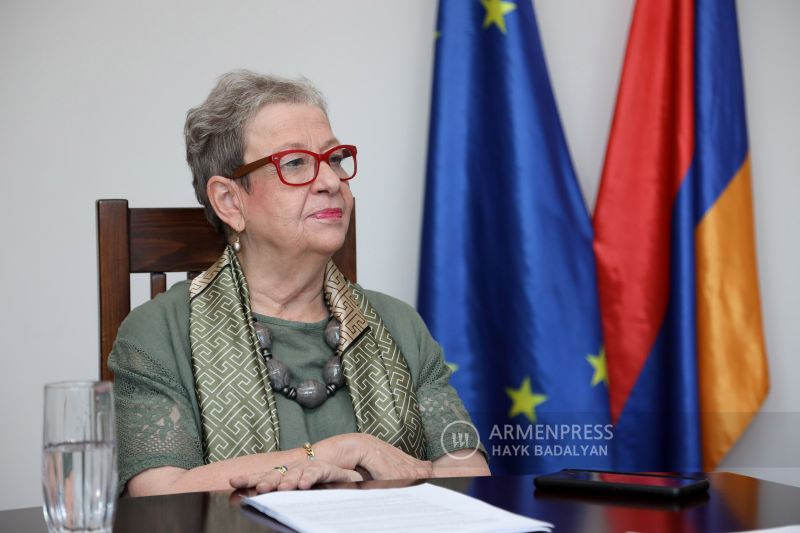
ARMENPRESS: You mean in terms of foreign policy it does not contradict to the relations with other international partners.
Ambassador Wiktorin: No. This is also the philosophy of the Eastern Partnership. There we have a clear indication that each of our partners decides the level of integration, the speed of the process according to their wishes.
ARMENPRESS: Ms. Ambassador, what kind of perspectives do you see for a long-term peace establishment in the region, including the long-lasting and comprehensive settlement of Nagorno-Karabakh conflict and the resolution of relations between Armenia and Azerbaijan in a broader sense, as we see some negotiation processes by the Russian mediation, by the European mediation on the post-war humanitarian issues, unblocking the transport and economical communications in the region, delimitation and demarcation of state boundaries between the Republic of Armenia and the Republic of Azerbaijan.
Ambassador Wiktorin: First of all, the EU is interested in reconciliation and a sustainable solution. We regret every incident that happened. It is important to ensure that a proper environment is in place to guarantee progress in the several areas you mentioned. In this context, I have to say that more needs to be done to achieve the return of remaining prisoners, ensure progress in the area of demining as well as the search for missing persons.
Indeed, we welcome all efforts to achieve normalization between Armenia and Azerbaijan, and we are in favor of a comprehensive settlement of all conflict-related issues. The EU strongly supports the ongoing and future talks on the border issues, unblocking of communication links in the region, peace treaty and reconciliation efforts. Since the end of the 2020 war, we have been engaged at the highest level by President Michel to contribute, in addition to other efforts that exist, in the normalization of the Armenian-Azerbaijani relations. Our objective is to see successes in all these areas.
ARMENPRESS: One of the key things is the format of diplomatic negotiations to reach a political settlement of any conflict. I mean, before the 2020 war it was much clearer in terms of the format around Nagorno-Karabakh conflict: the three Co-Chairs of the OSCE Minsk Group, Russia, France, on behalf of the EU, and the United States, were cooperating constructively to provide mediation between the conflicting sides. Now there is some uncertainty in the post-war situation, as Moscow claims that the Western partners refused to work with Russia inside the Minsk Group. Although both France and the US keep saying that they are willing to work on this issue, including through their role as OSCE Minsk Group Co-Chairs. On this background, we see very active diplomatic efforts by the President of European Council, Mr. Charles Michel, organizing three or four meetings recently between the leaders of Armenia and Azerbaijan. Is this mediation in the frame of logic of the OSCE Minsk Group Co-Chairmanship or it is somewhat more separate or parallel diplomatic initiative?
Ambassador Wiktorin: The position of the EU has been quite clear before and also during the war that we are in full support of the efforts of the OSCE Minsk Group led process. It was really the OSCE Minsk Group Co-Chairs, who were in the lead. Yes, you are right that the European Union has undertaken a more active stance now and plays a visible role at the highest possible level, by President Michel, as well as in regular consultations and visits of the EU Special Representative for the South Caucasus and the Crisis in Georgia Toivo Klaar. He was here again on 13 and 14 July. Therefore, we are in very regular contacts, President Michel is personally engaged.
These efforts are in no way in competition or against other actors; I need to underline this as we see many speculations on the matter. We need to speak about complementarity, not competition.
The three trilateral meetings, which took place in December in Brussels, in April, and on May 22, were all meant to support a sustainable solution. At the same time, and I think it’s also appreciated by the leaders, Toivo Klaar, the EU Special Representative initiated high level meetings also hosted in Brussels between the Secretary of the National Security Council of Armenia Armen Grigoryan and Hikmet Hajiyev, Advisor of President of Azerbaijan Aliyev. These high-level interventions, the quality of exchanges are the contribution we can make and EU is really committed to continue our efforts in these formats. Naturally, we listen to what the two countries want. But I repeat again - it is not a competition; it is complementarity with other efforts. We welcomed direct contact that happened on 16 July in Tbilisi. EU welcomes the direct communication that was established between the two foreign ministers. I think all these elements come together, and there are efforts to find sustainable solution between the two countries.
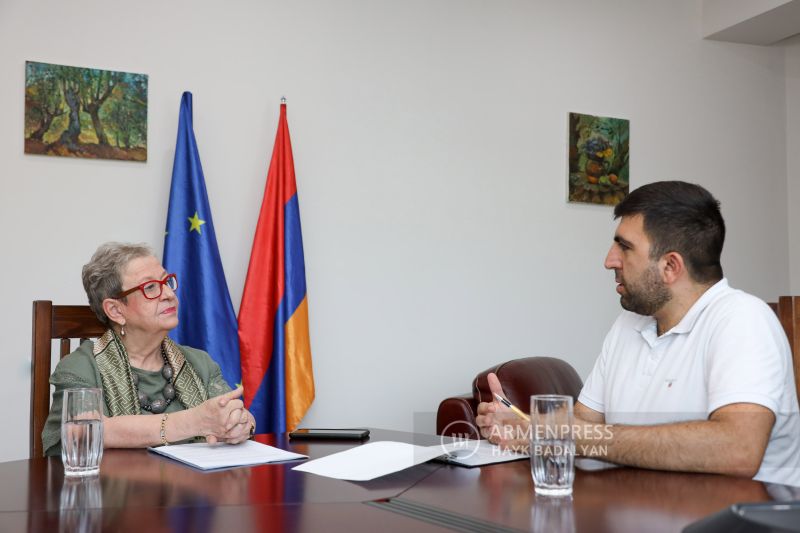
ARMENPRESS: And the last question. Do you see real chances for normalization of diplomatic relations between Armenia and the other neighbour, Turkey, as a new dialogue between Yerevan and Ankara officially started recently? What is the view of the EU on this issue especially in terms of possibility of opening Armenian-Turkish border?
Ambassador Wiktorin: The European Union is a strong supporter of normalization processes. There were public statements underlining that we support the initiative of direct discussions between Armenia and Turkey. We hope that this will lead to normalization. The phone call between Prime Minister of Armenia Pashinyan and President of Turkey Erdogan was an important step forward. For years the EU has been active and supporting the normalization process between Armenia and Turkey. We want to see progress, because we think that it is for the benefit of the people and will open more opportunities.
Interviewed by Aram Sargsyan
Photographer: Hayk Badalyan